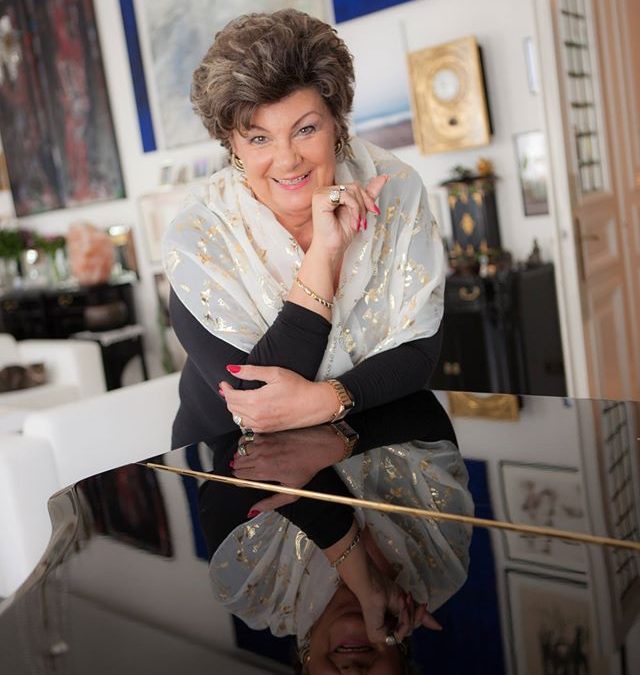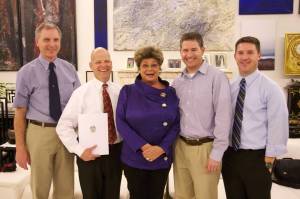Dr. Jutta Unkart-Seifert, President of the European Cultural Initiative for the Young Generation and former undersecretary of the Austrian Federal Ministry of Education, the Art and Sports, is well-known to most music ensembles that tour to Vienna with Music Celebrations. Dr. Unkart-Seifert opens her historic Viennese home to touring ensembles for a dinner and cultural exchange (and music – there is always music!).
Dr. Unkart-Seifert, a renowned Austrian soprano who specializes in singing lieder, has performed with orchestras all over the world. Every group that has visited her for a dinner and reception has listed the evening as a highlight of their tour experience! The following is an excellent article about Dr. Unkart-Seifert’s background, philosophy, and views on life and music:
A small girl arrives at a cemetery in Vienna, Austria, leading her father, who is completely blind, by the hand. He is a professional singer, but in order to earn extra money for his family he has taken a job singing at funerals. His daughter, although very young, listens solemnly with the mourners by the grave, watching protectively over her father with warm, loving eyes until the service is over. Occasionally, she raises her face to the sun and gazes into the far reaches of the sky. “It was there I learned the most fundamental lessons in life,” Dr. Jutta Unkart-Seifert recalls. “There I was, only five years old, standing before coffins. I naturally came to wonder about the meaning of death, and then the meaning of life . . . I still ask myself those same questions: Do we merely live to eat? Or to watch mindless TV programs? Or to speak ill of others? Or to fight wars? Surely that is not what life is all about. And I think that those who face up to the inevitability of death realize just how precious life is. They cannot fail to devote every minute of their lives to developing and improving themselves.”
Jutta’s father was also a voice teacher. During the Second World War, a bomb destroyed every part of her parents’ home except for the music room, so it was there that Jutta’s cradle was placed and she grew up. Her father had many pupils and gave lessons for 10 to 12 hours each day, so from morning to night young Jutta’s cradle was rocked by the gentle hand of music. Both her mother and father were visually handicapped. They faced terrible discrimination during the war and the ever-present threat of being sent to a Nazi concentration camp because of their disability. In addition, the war claimed the lives of four of Jutta’s relatives. Those were terrible times. Yet, somehow her parents always managed to remain cheerful. “I had a truly wonderful childhood,” says Dr. Unkart-Seifert. “Because I had to help take care of my parents and because of my music and voice lessons, I couldn’t run around and play freely like other children, but I never once felt my life to be hard or painful. Every day, I lived in a beautiful world of song–a palace of the spirit. Song is what nourished my heart. For that, I am deeply grateful.” As she grew up, Dr. Unkart-Seifert attended Vienna University, where she avidly studied German literature, classical linguistics, and everything else that interested her. Her PhD dissertation was on the linguistic structure of the writings of the German philosopher Arthur Schopenhauer. She recalls her father being sad that she had moved away from music. But when he died, a strange thing happened: Jutta suddenly felt the desire to perform again, and could not imagine a life without music. Now it was her turn to sing. Perhaps she felt that she couldn’t let her father’s song end with his death. After a 10-year absence from music, she had to start all over again. It was a difficult challenge. The saying, “Where there’s a will, there’s a way,” became her motto and her guide. Now, among her many vocations, Dr. Unkart-Seifert sings professionally, and the Min-On Concert Association has been able to introduce her to Japanese audiences. The lyrics of “An die Musik,” a Schubert song in her repertoire, surely echo her own feelings:
Thou lovely art, how often in dark hours, when life’s tumult wraps me round, have you kindled my heart to loving warmth, transported me to a better world.
In Dr. Unkart-Seifert’s mind, the aim of music and that of human existence are the same: a search for a better world, a search for the divine. “Art is the expression of the divine within us,” she says. “I always feel that when I am performing, it is not me singing but the divine spirit within me.” Art and spirituality are like two sides of the same coin. Religion without art is cold and barren, and art that does not seek the eternal lacks the vitality and power to move our hearts. Dr. Unkart-Seifert lives an incredibly full life. She is a singer and a public servant, a doctor of philosophy and a warm, home-loving person. However, when I think about her energetic life, I am always reminded most of her unaffected smile. In her career in government, Dr. Unkart-Seifert has also faced many struggles. She was told repeatedly that a woman’s place was in the home. “It was a battle against a lack of understanding,” she says of those early days. “I had to work five times harder than anyone else. I would never have made it if I hadn’t had good health and the energy to bounce back from the hardships I faced.” She has served as under secretary of the Austrian Federal Ministry of Education, the Arts and Sports, and as director of the ministry’s international department. For many years, even before the collapse of communism in the countries of Eastern Europe and the former Soviet Union, she was committed to cultural exchanges with those countries. Artists there enjoy much greater political freedom today, but financially they are worse off because of the difficult transition to the market economy. For their sake, Dr. Unkart-Seifert works tirelessly to create opportunities for promising young artists, doing whatever she can when she sees a need. This is her guiding principle in life. “With each passing year,” she says, “I come to feel more keenly how short life is and how I must leave something of value behind. I want to devote myself to those who need me. Today or tomorrow may be my last opportunity; that is why I hope to do things that will be of lasting value, now.” Dr. Unkart-Seifert is not only filled with love for humanity in her public role, but she is also the supportive and caring partner of her husband, Dr. Ralf Unkart, a professor at Vienna Technical University. She has a message to share with other women: “Be confident and believe in yourself. The compassion of women who love humanity is stronger and deeper than the ocean.” Although she never dwells on her hardships, her life shines with the pristine brilliance that comes only after a cleansing rain of tears. Jutta Unkart-Seifert sings with warmth and feeling. As an encore after a performance in Saitama, Japan, in 1993, she sang in Japanese the song “Mother,” the lyrics of which I composed. The music passed from heart to heart–the singer’s heart touching those of the audience, until they became one. An elderly woman in the front row was weeping openly. After Dr. Unkart-Seifert finished her song, she stepped down from the stage and gave the bouquet she had received to this woman, and when the concert was over, she sought her out and spoke to her. Those who have known great suffering themselves are sensitive to others’ feelings, respecting and treasuring each individual. Dr. Unkart-Seifert also sang Wagner’s “Schmerzen” at that concert:
If only death gave birth to life, If only pain brought joy: How I should thank nature For giving me such pain!
As long as we live, we are bound to experience problems and sufferings: they are proof that we are alive. We encounter obstacles precisely because we are making progress. When we fearlessly forge ahead and overcome them, our lives become brighter and richer and our horizons broaden. True happiness is, after all, the feeling that one’s inner world has been enriched. The problems we face become our “teachers,” pointing out life’s treasures to us. “I have heard of the beautiful Buddhist expression, ‘Winter always turns into spring,’” says Dr. Unkart-Seifert. “In Austria, too, we have similar phrases such as ‘The sun always shines after it rains.’ It was my parents who taught me to live in this bright, positive way.” The little girl who once served as her parents’ eyes now shines with a commitment to bring light to the lives of others. As if still clasping her father’s warm hand in her own, Dr. Unkart-Seifert holds on firmly to his legacy, treasuring the life, the song and the brightness that he gave her.



What a wonderful and beautiful lady. I have been inspired to start playing violin again after not playing for many years. Reading about Dr. Unkart-Seifert inspires me more!
I also appreciate her philosophy on the wonders of life.
Thank you!
I recently was at Dr. Unkart-Seifert’s home for dinner as a part of Music Celebrations. It was a lovely event and was personally so kind and supportive of me to sing and do more with my voice. What an inspiration!!!